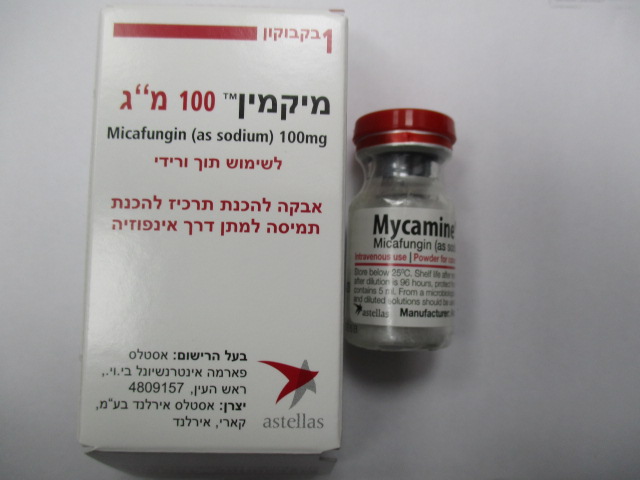Quest for the right Drug

מיקמין 100 מ"ג MYCAMINE 100 MG (MICAFUNGIN AS SODIUM)
תרופה במרשם
תרופה בסל
נרקוטיקה
ציטוטוקסיקה
צורת מתן:
תוך-ורידי : I.V
צורת מינון:
אבקה להכנת תמיסה מרוכזת לעירוי : POWDER FOR CONCENTRATE FOR SOLUTION FOR INFUSION
עלון לרופא
מינוניםPosology התוויות
Indications תופעות לוואי
Adverse reactions התוויות נגד
Contraindications אינטראקציות
Interactions מינון יתר
Overdose הריון/הנקה
Pregnancy & Lactation אוכלוסיות מיוחדות
Special populations תכונות פרמקולוגיות
Pharmacological properties מידע רוקחי
Pharmaceutical particulars אזהרת שימוש
Special Warning עלון לרופא
Physicians Leaflet
Adverse reactions : תופעות לוואי
4.8 Undesirable effects Summary of the safety profile Based on clinical trial experience, overall 32.2% of the patients experienced adverse drug reactions. The most frequently reported adverse reactions were nausea (2.8%), blood alkaline phosphatase increased (2.7%), phlebitis (2.5%, primarily in HIV infected patients with peripheral lines), vomiting (2.5%), and aspartate aminotransferase increased (2.3%). Tabulated list of adverse reactions In the following table adverse reactions are listed by system organ class and MedDRA preferred term. Within each frequency grouping, undesirable effects are presented in order of decreasing seriousness. System Organ Common Uncommon Rare Not known Class ≥ 1/100 to < 1/10 ≥ 1/1,000 to < 1/100 ≥ 1/10,000 to (frequency < 1/1,000 cannot be estimated from available data) Blood and leukopenia, pancytopenia, haemolytic disseminated lymphatic system neutropenia, anaemia thrombocytopenia, anaemia, intravascular disorders eosinophilia, haemolysis coagulation hypoalbuminaemia (see section 4.4) Immune system anaphylactic / anaphylactic disorders anaphylactoid and reaction (see section anaphylactoid 4.4), hypersensitivity shock (see section 4.4) Endocrine hyperhidrosis disorders Metabolism and hypokalaemia, hyponatraemia, nutritional hypomagnesaemia, hyperkalaemia, disorders hypocalcaemia hypophosphataemia, anorexia Psychiatric insomnia, anxiety, disorders confusion Nervous system headache somnolence, tremor, disorders dizziness, dysgeusia Cardiac disorders tachycardia, palpitations, bradycardia System Organ Common Uncommon Rare Not known Class ≥ 1/100 to < 1/10 ≥ 1/1,000 to < 1/100 ≥ 1/10,000 to (frequency < 1/1,000 cannot be estimated from available data) Vascular phlebitis hypotension, shock disorders hypertension, flushing Respiratory, dyspnoea thoracic and mediastinal disorders Gastrointestinal nausea, vomiting, dyspepsia, disorders diarrhoea, abdominal constipation pain Hepatobiliary blood alkaline hepatic failure (see hepatocellular disorders phosphatase increased, section 4.4), gamma- damage aspartate glutamyltransferase including fatal aminotransferase increased, jaundice, cases (see increased, alanine cholestasis, section 4.4) aminotransferase hepatomegaly, increased, blood hepatitis bilirubin increased (including hyperbilirubinaemia), liver function test abnormal Skin and rash urticaria, pruritus, toxic skin subcutaneous erythema eruption, tissue disorders erythema multiforme, Stevens- Johnson syndrome, toxic epidermal necrolysis (see section 4.4) Renal and urinary blood creatinine renal disorders increased, blood urea impairment increased, renal (see section failure aggravated 4.4), acute renal failure General disorders pyrexia, rigors injection site and thrombosis, infusion administration site inflammation, site conditions injection site pain, peripheral oedema Investigations blood lactate dehydrogenase increased Description of selected adverse reactions Possible allergic-like symptoms Symptoms such as rash and rigors have been reported in clinical studies. The majority were of mild to moderate intensity and not treatment limiting. Serious reactions (e.g. anaphylactoid reaction 0.2%, 6/3028) were uncommonly reported during therapy with micafungin and only in patients with serious underlying conditions (e.g. advanced AIDS, malignancies) requiring multiple co-medications. Hepatic adverse reactions The overall incidence of hepatic adverse reactions in the patients treated with micafungin in clinical studies was 8.6% (260/3028). The majority of hepatic adverse reactions were mild and moderate. Most frequent reactions were increase in AP (2.7%), AST (2.3%), ALT (2.0%), blood bilirubin (1.6%) and liver function test abnormal (1.5%). Few patients (1.1%; 0.4% serious) discontinued treatment due to a hepatic event. Cases of serious hepatic dysfunction occurred uncommonly (see section 4.4). Injection-site reactions None of the injection-site adverse reactions were treatment limiting. Paediatric population The incidence of some adverse reactions (listed in the table below) was higher in paediatric patients than in adult patients. Additionally, paediatric patients < 1 year of age experienced about two times more often an increase in ALT, AST and AP than older paediatric patients (see section 4.4). The most likely reason for these differences were different underlying conditions compared with adults or older paediatric patients observed in clinical studies. At the time of entering the study, the proportion of paediatric patients with neutropenia was several-fold higher than in adult patients (40.2% and 7.3% of children and adults, respectively), as well as allogeneic HSCT (29.4% and 13.4%, respectively) and haematological malignancy (29.1% and 8.7%, respectively). Blood and lymphatic system disorders common thrombocytopenia Cardiac disorders common tachycardia Vascular disorders common hypertension, hypotension Hepatobiliary disorders common hyperbilirubinaemia, hepatomegaly Renal and urinary disorders common acute renal failure, blood urea increased Reporting of suspected adverse reactions Reporting suspected adverse reactions after authorisation of the medicinal product is important. It allows continued monitoring of the benefit/risk balance of the medicinal product. Any suspected adverse events should be reported to the Ministry of Health according to the National Regulation by using an online form http://forms.gov.il/globaldata/getsequence/getsequence.aspx?formType=AdversEffectMedic@moh.go v.il

פרטי מסגרת הכללה בסל
התרופה תינתן לאחד מאלה:א. טיפול בזיהומי קנדידה חודרניים ב. מניעה של זיהומי קנדידה בחולים העוברים השתלת מח עצם וצפויים לפתח נויטרופניה למשך 10 ימים ומעלה.
מסגרת הכללה בסל
התוויות הכלולות במסגרת הסל
| התוויה | תאריך הכללה | תחום קליני | Class Effect | מצב מחלה |
|---|---|---|---|---|
| זיהומי קנדידה חודרניים קשים העמידים לטיפול ב-FLUCONAZOLE. | CASPOFUNGIN, ANIDULAFUNGIN, MICAFUNGIN | |||
| אספרגילוזיס חודרני בחולים שנכשלו או שפיתחו אי סבילות באחד הטיפולים האחרים כגון: אמפוטריצין B, פורמולות ליפידיות של אמפוטריצין B או איטראקונאזול; |
שימוש לפי פנקס קופ''ח כללית 1994
לא צוין
תאריך הכללה מקורי בסל
21/01/2016
הגבלות
תרופה מוגבלת לרישום ע'י רופא מומחה או הגבלה אחרת
מידע נוסף
